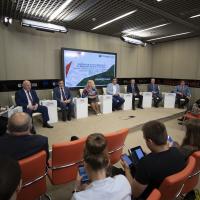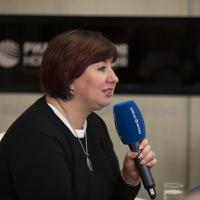MIA «Rossiya segodnya” has organized a round table which was attended by representatives of the leading Russian universities. They discussed the main trends and results of the admission campaign 2019 and gave advice to future applicants.
The keynote of the meeting was the discussion of further increase in competition of applicants per one budget place as one of the important trends of this year was the rise of the average score of the unified state exam. According to official data of the Ministry of Science and Higher Education of the Russian Federation, the Ministry of Education, Rosobrnadzor, 139 thousand people passed exam in physics, 124 thousand — biology, 103 thousand — history, 89 thousand — chemistry, 75 thousand — computer science, 315 thousand people — social studies, i.e. almost half of the applicants had chosen social studies. At the same time, those who passed this subject had an ability to apply for only 40% of the total number of budget places. There has also been an increase in demand for language exams, particularly in Chinese and Spanish.
About 714 thousand first-year students were enrolled in Russian universities, 464 thousand of them – on a budgetary basis. The largest number of applications was submitted in such areas as medicine, journalism, economics and international relations. The competition in these areas was more than 14 people per place.
Top-regions of this admission campaign are Moscow, St.Petersburg, Tomsk, Tatarstan, Bashkortostan, Sverdlovsk region, Yaroslavl region, and Nizhny Novgorod.
Representatives of Russian universities stressed that applicants had become more conscious in their choice, carefully studied the curriculum, expressed a desire to study in more complex programs, were willing to pay for a specific choice, were interested in international internships, had become more mobile in the educational environment, and expressed a desire to build their individual educational trajectory.
Also discussants addressed the topics of meta-subject of universities, and typical strategies of enrollment. It was noted that Russian education has become increasingly popular in the CIS and Asia countries, respectively, the demand for English-speaking programs has been increasing, as well as among Russian students.
MEPhI’s vice-rector Elena Vesna noted that this year applicants’ average score of the state exam in engineering areas continued to increase in the University, and the competition among applicants had reached 20 people per place. Despite the fact that physics (as a complex subject) is still passed by an insufficient number of applicants, many talented children with very high scores go to engineering areas. In her opinion, choosing the exam an applicant needs to focus not on the complexity of the exam, but on "…what areas you are most interested in and where you have great prospects." The vice-rector identified the features of the admission campaign 2019, among which there are, firstly, the increase in the number of students who, choosing MEPhI for admission and assessing their chances to be enrolled at the Moscow site, decided to submit documents in the branches of the University. "They understand that now in the regions there is really an opportunity to get a quality education. For example, we have regional units located near the leading world-class nuclear centers, whose employees teach at the University."
In addition, vice-rector noted the growth of awareness of the choice of future students: the percentage of those who did not apply to any other universities except MEPhI has grown, there were those who applied for only one direction instead of three permitted: "This suggests that guys clearly know what they want."
The third feature is a large number of applicants who have extensive experience of participation in engineering projects and competitions. "We gave a wide opportunity to take into account these achievements, and guys took advantage of it."
The vice-rector advised future applicants to actively participate in career guidance activities offered by universities. "95% of our applicants are those who passed through our training system, full-time or remotely (the number of students remotely studying at the University has reached 24 thousand people). Therefore, get involved in career guidance projects of universities as early as possible, work in this direction. It will help you to make the right choice."







